- Home
- W. Somerset Maugham
Merry Go Round Page 10
Merry Go Round Read online
Page 10
'No, don't do that,' she said, getting up and moving away. 'Please stay where you are. I can't say it if I look at you.'
He paused, wondering what was in her mind. She spoke brokenly, as though by an effort almost beyond her strength.
'Are you sure you love me, Basil?'
'Quite sure,' he answered, trying to smile.
'Because I don't want to be married out of pity or anything like that. If you're only doing it because you think you ought, I'd rather go on as I am.'
'But why d'you say this now, Jenny?'
'I've been thinking it over. The other day when you offered to marry me I was so happy I couldn't think it out. But I love you so much that I've seen things quite differently since then. I don't want to hurt you. I know I'm not the sort of woman you ought to marry, and I can't help you to get on.'
Her voice trembled, but she forced herself to continue, and Basil, motionless, listened to her gravely. He could not see her face.
'I want to know if you really care for me, Basil. If you don't, you've only got to say so, and we'll break it off. After all, I'm not the first girl that's got into trouble; I could easily manage, you know.'
For one moment he hesitated, and his heart beat painfully. Miss Ley's cold advice, his mother's scorn, recurred to him: the girl herself offered an opportunity, and would it not, after all, be best to seize it?
His freedom stood before him, and he exulted; a few easy words might destroy that horrible nightmare, and he could start life afresh, wiser and better. But Jenny turned round, and in her sad, beautiful eyes he saw a mortal anxiety; in the sickening anguish of her expectation she could scarcely breathe. He had not the strength to speak.
'Jenny, don't torture yourself,' he said brokenly. 'And you torture me, too. You know I love you, and I want to marry you.'
'Straight?'
'Yes.'
She sighed deeply, and heavy tears fell down her cheeks. For a while she remained silent.
'You've saved my life, Basil,' she said at last. 'I made up my mind that if you didn't want to marry me I'd do away with myself.'
'What nonsense you talk!'
'I mean it. I couldn't have faced it. I'd fixed it all up in my head – I should have waited till it was dark, and then I'd have gone over the bridge.'
'I will do my best to be a good husband to you, Jenny,' he said.
But when Jenny left him, Basil, utterly bowed down, surrendered himself to an uncontrollable depression. It came to his mind that Miss Ley had likened existence to a game of chess, and now bitterly he recalled each move that he should have played differently: again and again the result hung as on a balance, so that if he had acted otherwise everything would have gone right; but each time the choice appeared to matter so little one way or the other, and it was not till afterwards that he saw the fateful consequence. Every move was irretrievable, but at the moment seemed strangely unimportant; it was not a fair game, for the issue was hidden constantly by a trivial mask. And then it appeared to him as though, after all, he had never had a choice in the matter; he felt himself powerless in the hand of a greater might, and Fate, for once grown ghastly visible, directed each step as though he were a puppet. Now life before him loomed black and cheerless, and even his child, the thought of which had been his greatest strength, offered no solace.
'Oh, what shall I do?' he moaned – 'what shall I do?' He remembered with a shudder Jenny's threat of suicide, and he knew that she would have carried it out, unhesitating; a sudden impulse seized him in just such a manner to finish with all that doubt and misery. But then, setting his teeth, he sprang up.
'I won't be such a funk,' he cried savagely. 'After all, I've made my bed and I must lie on it.'
9
A FEW days later Basil was married, and Frank, who had assisted him in the rather sordid proceedings of the registry office, going back to his rooms, found Reggie Bassett comfortably lounging in an armchair, with his long legs on another. By his side were Frank's cigarettes and the whisky-and-soda.
'I see you make yourself at home, my friend.'
'I was passing this way and I hadn't got anything particular to do, so I thought I'd look in: my mamma thinks your society good for me. Got your wedding over?'
'What do you know about it?' asked Frank sharply.
'More than you think, my boy,' answered Reggie, with a grin. 'The mater told me as a solemn warning. She says Kent's married a barmaid, and it's the result of keeping bad company and going to pubs. What did he do it for?'
'If I were you I'd mind my own business, Reggie.'
'If it's because she's in the family way, he's a bally ass. If I got in a mess like that, I'd see the lady shot before I married her.
'I have some work to do, my friend,' said Frank shortly. 'You would show discretion if you took yourself off.'
'All right! I'll just have another drink,' he answered, helping himself to the whisky. 'I'm going out to tea with Mrs Castillyon.'
Frank pricked up his ears, but said nothing. Reggie looked at him, smiled with great self-satisfaction, and winked.
'Smart work, ain't it – considering I've only known her a fortnight. But that's the right way with women – rush 'em. I saw she was smitten the first time we met, so I made a dead-set for her. I knew she was all right, so I just told her what I wanted; by Jove, she is a little baggage! I've come to the conclusion I like ladies, Frank; you don't have to beat about the bush. You just come to the point at once, and there's no blasted morality about them.'
'You're a philosopher, Reggie.'
'You think I'm rotting, but I'm not. I'll read you the letter she wrote me. By the way, I'm going to give her your address – in case the mater stops anything.'
'If letters come for you here, my friend, they shall be promptly returned to the postman.'
'You are a low blackguard; it wouldn't hurt you,' said Reggie crossly. 'But if you think that'll stop her writing, it won't, as I shall just have them sent to my crammer's. I say, I must read you this; it's rather funny.'
Reggie took from his pocket a letter on which Frank recognized Mrs Castillyon's large writing.
'Don't you think it's playing it rather low down to show the private letters which a woman has written you?'
'Rot!' cried Reggie, with a laugh. 'If she didn't want anyone to see them, she oughtn't to have written.'
With manifest pride he read parts of an epistle which would have left the President of the Divorce Court few doubts as to the relations between the happy pair. The wretched woman's love tickled his vanity, and to him the pleasure lay chiefly in boasting of it: he uttered with rolling emphasis certain expressions of endearment.
'"Yours till death,"' he finished. 'Good Lord, what rot women write! and the funny thing is that it's always the same rot. But there's not much doubt about this, is there? She's as far gone as she can be.'
'Amiable youth!' said Frank. 'Does your mother know that you have struck up an acquaintance with Mrs Castillyon?'
'Rather! At first the mater thought her a bit vulgar, but she looked her up in the Landed Gentry, and when she found out her grandfather was a lord she thought it must be all right. The mater's a bit of a snob, you know – her governor was in the City, and she's got it into her head that the Castillyons will ask us down to Dorsetshire. By Gad, if they do I'll make things hum.'
Reggie looked at his watch.
'I shall have to be scooting, or I shall be late for tea.'
'Aren't you supposed to be working?'
'Yes, but I can let that wait. You see, I'm not going up for the exam next time. The mater gave me the fees, and I blued them, so I shall just tell her that I've got through. It'll be all right in the end.'
'Isn't that very dishonest?'
'Why?' asked Reggie, with surprise. 'She keeps me so devilish short, and I must have money somehow. It'll all be mine when she pegs out, so it can't matter, you know.'
'And what about the little lady you dined with on Saturday?'
'Oh, I've chucke
d her. I think Mrs Castillyon will be more economical. She's got lots of tin, and I'm blowed if I see why a man should always be expected to fork out for women.'
'You're trying to reconcile two contradictory things, my boy – love and economy.'
Reggie marched off to Bond Street, and finding that Mrs Castillyon was not yet arrived, began to walk up and down; but having waited half an hour, he grew annoyed, and it was with no smiling countenance that he met the pretty little lady when at length she drove up.
'Have I kept you waiting?' she asked airily.
'Yes, you have,' he answered.
'It's good for you.'
She tripped in, and they ordered tea.
'I can't possibly eat those cakes,' she said. 'Tell them to bring some more.'
The next plateful was as little to her taste, and she called for a third.
'I think I like the first lot best, after all,' she said, when these were produced.
'You might have taken one of them straight away, instead of disturbing the whole place,' exclaimed Reggie, very peevish himself, but peculiarly impatient of that defect in others.
'That woman has nothing else to do: why shouldn't I disturb her? And she was very impudent; I have a good mind to report her.'
'If you do, I shall go and say that she was nothing of the sort.'
'This is a disgusting place; I can't think why you suggested it. Anyhow, I'll have some sweets to make up.'
Looking round, she saw a box of chocolates, elaborately decorated with ribands and artificial violets.
'You can get those for me. I love sweets – don't you?'
'Yes, when somebody else pays for them.'
She threw back her head and laughed boisterously, so that people turned round and looked. Reggie grew vexed.
'I wish you wouldn't make such a row. Everyone's staring at you.'
'Well, let them! Give me a cigarette.'
'You can't smoke here.'
'Why not? There's a woman over there smoking.'
'Yes, but she's no better than she should be.'
'Nonsense! It's Lady Vizard. It's only your friends in Piccadilly who are always thinking of propriety; they're so afraid of not behaving like ladies, and you can always tell them because they're so prim.'
Mrs Castillyon, powdered and scented, was dressed in the most outrageous taste, but no one could have been more fashionable; and she displayed uncommon sagacity when she said that her flaunting manners alone distinguished her from persons of easy virtue. She looked across at Lady Vizard, no less strikingly attired, but with a sort of flamboyant discretion which marked the woman of character: she sat with the young Lord de Capit, and Mrs Castillyon told Reggie the latest scandal about the pair.
'You know she's Mr Kent's mother, don't you? By the way, is it true he married a creature off the streets?'
'Yes,' said Reggie. 'Silly ass!'
He gave a vivid account of the affair according to his lights. Unaccountably, for Frank and Miss Ley, both highly discreet, alone knew the circumstances, Basil's adventure in a very elaborate form was current among all his friends.
'I say, Reggie, will you come to the play tomorrow? Lady Paperleigh's got a box for The Belle of Petersburg, and she's asked me to bring my man.'
'Am I your man?' asked Reggie.
'Why not?'
'It sounds bally vulgar. I should have thought it meant your valet.'
At this Mrs Castillyon laughed as she spoke at the top of her voice, so that people, to Reggie's confusion, again turned round.
'How prim you are! Is it your mamma's bringing-up, Reggie? She's rather an old frump, you know.'
'Thanks!'
'But I intend to ask her down to Jeyston for Christmas. We're going to have a house-party, and I mean to get Miss Ley and Dr Hurrell. I don't like him much, but Miss Ley won't come, without him. Pity she's not younger, isn't it? They could talk philosophy to more purpose then. They say she has a passion for young men; I wonder what she does with them. D'you think she was very gay in her youth?'
'She's a regular ripper, I know that,' answered Reggie, remembering the frequent tips which in his school-days the generous creature had slipped into his hand.
'I'm sure there was something,' expostulated Mrs Castillyon, 'or she wouldn't have lived so long in Italy.'
'My mother thinks her about the straightest woman she's ever known.'
'I wish you wouldn't keep thrusting your mother down my throat, Reggie. It's bad enough having to put up with Paul's, without getting yours as well. I suppose I shall have to ask that old cat for Christmas: she's awful, but as rich as they make 'em, and she'll get on with your mother first-rate. Let's go; I'm sick of this hole.'
When Reggie asked for the bill, he found the box of chocolates cost fifteen shillings, and preferring to spend his money exclusively on himself, was consequently none too pleased. Mrs Castillyon had kept the cab, and offered to drive her cavalier to Grosvenor Gardens, where she was going for a second tea.
'I've had a good time,' she said, when they arrived. 'You'd better give the driver five bob. Good-bye, Reggie. Mind you're not late tomorrow. Where shall we dine?'
'I don't mind as long as it's cheap,' he said, ruefully handing the cabman five shillings.
'Oh, I'll stand you a dinner,' said Mrs Castillyon.
'All right,' he answered, his face brightening. 'Let's go to the Carlton, then.'
Mrs Castillyon skipped into the house, and Reggie, who hated walking, to save money trudged sulkily home to Sloane Gardens: Frank showed much wisdom when he asserted that love and economy went seldom hand-in-hand.
'It's cost me over a quid,' he muttered. 'I could have dined Madge three times for that, and I'm blowed if she's so damned vulgar as that little baggage.'
But next day he met her in the Carlton vestibule, and they sat down to dinner. The waiter brought him a wine-card.
'What would you like to drink?' he asked.
'Something fizzy.'
This entirely agreed with Reggie's ideas, and since he was not to pay the bill, he took care to order the champagne he liked best, which was by no means the least expensive. Flattering himself on his educated palate, he drank the wine with added satisfaction because the price was high. Mrs Castillyon, overpowdered, with somewhat the look of a faded rose arranged under careful lights in a shop window to delude the purchaser that it had still its first freshness, was in high spirits: pleased with her own appearance and with that of the handsome youth in front of her, languid and sensual as the waking Adam of Michelangelo, she talked very quickly in an excessively loud voice. Reggie's spirits rose with the intoxicating liquor, and his doubts whether an amour with a woman of distinction was quite worth while were soon dissipated; looking at the costly splendour of her gown, the boy's flesh tingled, and his eyes rested with approval on the diamonds about her neck and in her yellow hair. It was a new sensation to dine with a well-dressed, rich woman in a crowded restaurant, and he felt himself with pride a very gay Lothario.
Handing something, he touched her fingers.
'Don't,' she said, 'you give me the shivers;' and seeing the effect she created, Mrs Castillyon displayed all her arts and graces.
'Confound this theatre! I wish we weren't bound to go to it'
'But we are. Lady Paperleigh is going with her man, and we've got to chaperon her.'
It pleased Reggie to sit in a box with a person of title, and he knew it would gratify his mother.
'Why don't they make your hubby a Baronet?' he asked ingenuously.
'My mother-in-law won't fork out. You see, Paul ain't what you might call a genius – he'd love a handle to his name, but the price has gone up lately, and a baronetcy is one of the few things you have to pay for money down.'
Reggie's appetite was large, and he went through the long dinner with huge satisfaction. When they arrived at dessert, he lit a cigarette and gave a sigh of contented repletion.
'Yet people say the pleasures of the intellect are higher than the pleasures of
the table,' he sighed.
He looked at Mrs Castillyon with heavy eyes, and since, like most men, love arose in his heart as an accompaniment to the satisfactory process of digestion, he gave her a peculiarly sensual smile.
'I say, Grace, don't you think you could come away for a week-end somewhere?'
'Oh, I couldn't risk it. It would be too dangerous.'
'Not if we go somewhere quiet. It would be a beano!'
Her heart beat quickly, and under those handsome, lazy eyes she felt a curious defaillance; his hand rested on the table, large, soft and smooth, and the sight of it sent through her an odd thrill.
'Paul's going up to the North to speak next month,' she said. 'That's our chance, isn't it?'
The risk fascinated her, and the whim for Reggie grew on a sudden to an ardent passion for which she was willing to venture all things.
'I say, I've got an idea,' she whispered, with sparkling eyes. 'Let's go to Rochester. Don't you remember, Basil Kent spoke of it the other day? I could easily say I was going down to see the view or whatever it is. I believe it's a dull hole, and nobody goes there but Americans.'
'All right,' he said. 'That'll do Al .'
'Now we must be getting off. Call for the bill.'
Mrs Castillyon felt for her pocket; then, throwing back her head, gave a little shriek of laughter.
'What's the matter?'
'I've forgotten my purse. You'll have to pay, after all. D'you mind?'
'Fortunately the mater gave me a fiver this morning,' he answered, without enthusiasm, and when he doled out the shining sovereigns, added to himself: 'By Jove, I'll punish her for this some time.'
Arriving at the theatre, they found Lady Paperleigh was not yet come and since they did not know the number of her box, were obliged to wait in the entrance. They waited for nearly half an hour, during which Mrs Castillyon grew every moment more peevish.
'It's perfectly disgusting and awfully rude of her,' she cried for the tenth time. 'I wish I hadn't come, and I wish to goodness you wouldn't stand there looking bored. Can't you say something to amuse me?'
'I should have thought you could wait for a few minutes without getting into a beastly temper.'

 The Skeptical Romancer: Selected Travel Writing
The Skeptical Romancer: Selected Travel Writing The Summing Up
The Summing Up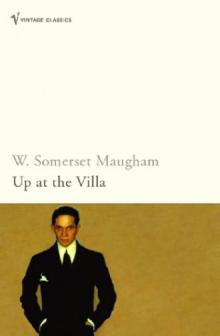 Up at the Villa
Up at the Villa The Razor's Edge
The Razor's Edge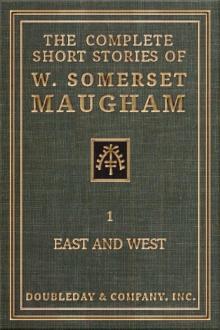 The Complete Short Stories of W. Somerset Maugham: East and West (Vol. 1 of 2))
The Complete Short Stories of W. Somerset Maugham: East and West (Vol. 1 of 2))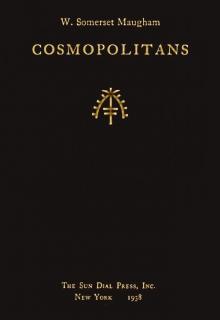 Cosmopolitans
Cosmopolitans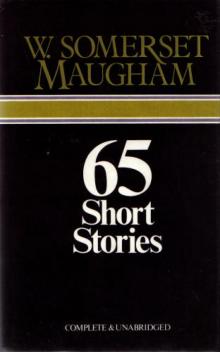 65 Short Stories
65 Short Stories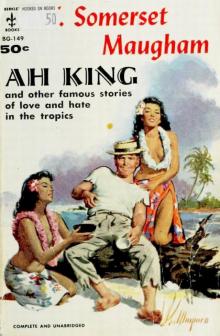 Ah King (Works of W. Somerset Maugham)
Ah King (Works of W. Somerset Maugham)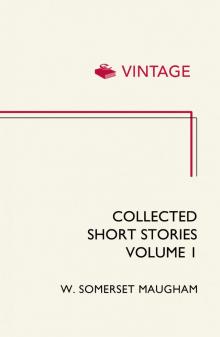 Collected Short Stories: Volume 1
Collected Short Stories: Volume 1 Collected Short Stories Volume 2
Collected Short Stories Volume 2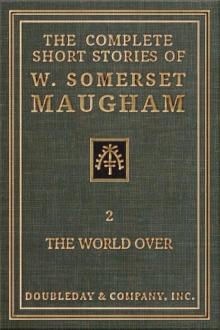 The Complete Short Stories of W. Somerset Maugham - II - The World Over
The Complete Short Stories of W. Somerset Maugham - II - The World Over Collected Short Stories Volume 4
Collected Short Stories Volume 4 Theatre
Theatre Short Stories
Short Stories Then and Now
Then and Now The Favorite Short Stories of W. Somerset Maugham
The Favorite Short Stories of W. Somerset Maugham Of Human Bondage
Of Human Bondage The Magician
The Magician The Great Exotic Novels and Short Stories of Somerset Maugham
The Great Exotic Novels and Short Stories of Somerset Maugham A Writer's Notebook
A Writer's Notebook Christmas Holiday
Christmas Holiday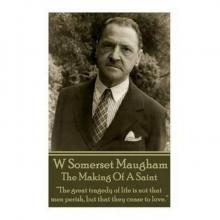 The Making of a Saint
The Making of a Saint Merry Go Round
Merry Go Round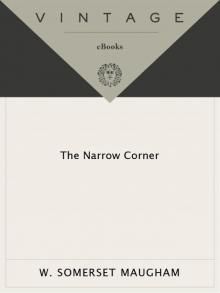 The Narrow Corner
The Narrow Corner Collected Short Stories Volume 3
Collected Short Stories Volume 3 Ten Novels and Their Authors
Ten Novels and Their Authors Ashenden
Ashenden The Moon and Sixpence
The Moon and Sixpence Cakes and Ale
Cakes and Ale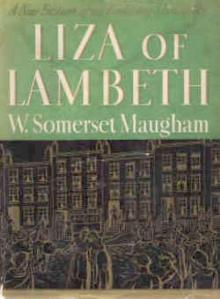 Liza of Lambeth
Liza of Lambeth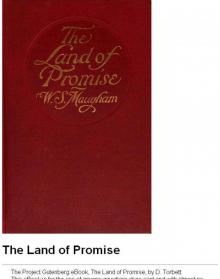 The Land of Promise: A Comedy in Four Acts (1922)
The Land of Promise: A Comedy in Four Acts (1922) A Writer's Notebook (Vintage International)
A Writer's Notebook (Vintage International)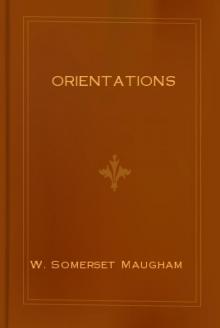 Orientations
Orientations Selected Masterpieces
Selected Masterpieces Mrs Craddock
Mrs Craddock The Skeptical Romancer
The Skeptical Romancer On a Chinese Screen
On a Chinese Screen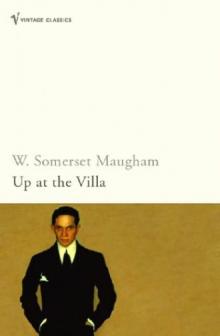 (1941) Up at the Villa
(1941) Up at the Villa The Great Novels and Short Stories of Somerset Maugham
The Great Novels and Short Stories of Somerset Maugham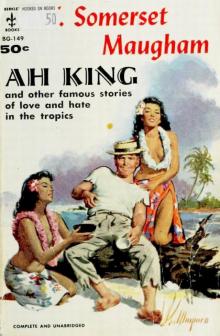 Ah King
Ah King The Explorer
The Explorer The Skeptical Romancer: Selected Travel Writing (Vintage Departures)
The Skeptical Romancer: Selected Travel Writing (Vintage Departures)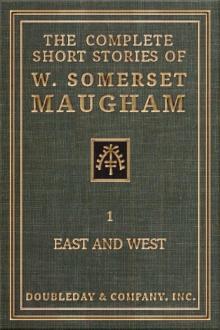 The Complete Short Stories of W. Somerset Maugham - I - East and West
The Complete Short Stories of W. Somerset Maugham - I - East and West